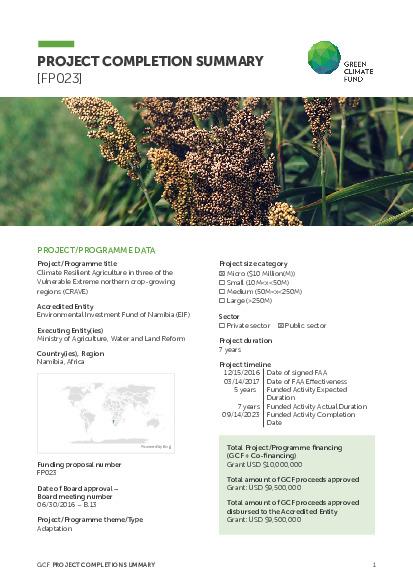Climate Resilient Agriculture in three of the Vulnerable Extreme northern crop growing regions (CRAVE)
The CRAVE project was initiated in December 2016 and aimed to reduce food insecurity and vulnerability of rural populations to climate change in the Kavango West, Kavango East, and Zambezi regions. The project targeted 3,000 direct small-scale farmers (SSF) over 5,000 hectares, focusing on conservation agriculture (CA) and climate-resilient agriculture (CRA) practices to improve crop production and livelihoods.
Achievement wise, the CRAVE project successfully exceeded its targets, directly benefiting 3,158 small-scale farmers (65% female) with conservation agriculture goods and training 3,065 farmers in climate-resilient practices. The project established the Mashare Climate Resilient Agriculture Centre of Excellence (MCRACE) which has become a hub for training and research, benefiting over 2,831 small-scale farmers, created 1,646 jobs (35% female), and expanded horticultural production to 105.5 hectares. Notable outcomes included distributing 41 solar-powered water pumps, installing a 125kW solar PV plant, deploying 35 tractors covering 3,709 hectares, and reaching 19,010 farmers with training and support. The project facilitated market linkages for 3,065 farmers and piloted a crop insurance scheme for 168 vulnerable farmers.
Key lessons learned: include the importance of community involvement in decision-making to prevent land disputes and the need for timely recruitment of skilled staff to enhance project implementation. The integration of climate-smart agriculture with irrigated horticulture proved to be a game-changer for food security and farmer resilience. Proper site selection requires extensive community consultation and traditional leadership involvement to ensure project sustainability. The project demonstrated that combining conservation agriculture with renewable energy technologies creates synergies that enhance both climate adaptation and income diversification for small-scale farmers.
Sustainability and exit strategy: To ensure sustainability, the project established partnerships with local organizations, including AgriBank and Agro-Marketing & Trade Agency (AMTA), to continue supporting farmers beyond the project's lifespan. The project assets were transferred to the Ministry of Agriculture, Water and Land Reform (MAWLR) to maintain ongoing support for small-scale farmers. The project also developed a crop insurance scheme to provide financial security to vulnerable farmers against climate risks.
The CRAVE project has successfully improved the adaptive capacity and resilience of small-scale farmers in Namibia, contributing to food security and sustainable agricultural practices. The collaboration between EIF, MAWLR, and various stakeholders has laid a strong foundation for future initiatives in climate-resilient agriculture.

Project completion summary for FP023: Climate Resilient Agriculture in three of the Vulnerable Extreme northern crop-growing regions (CRAVE)
12 Aug 2025
This Project Completion Summary (PCS), contains details from the Project Completion Report (PCR) submitted by Accredited Entities at the end of a project’s implementation timeframe. The PCS presents a concise overview of a completed project's performance and delivered outcomes. The summary includes four key components:
Project timeline
Pipeline
19 Apr 2016 • 179 days
Cleared by GCF Secretariat
19 Apr 2016
Funding proposal received
22 Apr 2016
Legal opinion on AE's Internal Approval
01 Sep 2016
Approved
14 Oct 2016 • 152 days
Approved by GCF Board
14 Oct 2016
Cleared by iTAP
14 Oct 2016
FAA executed
15 Dec 2016
Under implementation
14 Mar 2017 • 2,558 days
FAA effective
14 Mar 2017
Disbursement - USD 3,085,000
21 Jun 2017
Annual Performance Report
01 Mar 2018
Annual Performance Report
01 Mar 2019
Disbursement - USD 3,670,000
18 Apr 2019
Disbursement - USD 1,240,000
24 Nov 2020
Disbursement - USD 1,505,000
07 Mar 2022
Completed
14 Mar 2024
-
Financing
- Private sector
- Public sector
-
Size
- Micro
- Small
- Medium
- Large
GCF financing100% disbursed
| Instrument | Amount |
|---|---|
| Grant | USD 9,500,000 |
| Total GCF Financing |
|---|
| USD 9,500,000 |
Co-financing
| Co-financer | Instrument | Amount |
|---|---|---|
| Co-Financing | Grant | USD 500,000 |
| Total Co-Financing |
|---|
| USD 500,000 |
GCF Contacts
General media inquiries
GCF CommunicationsSend e-mail
Request for information
GCF Information DisclosureRequest information about this project
Project complaints and grievances
GCF Independent Redress Mechanism (IRM)Phone +82 32 458 6186 (KST)
File a complaint
Integrity issues
GCF Independent Integrity Unity (IIU)Phone +82 32 458 6714 (KST)
Send e-mail
Entity

Environmental Investment Fund
Chief Executive Officer
Chief Operations Officer
More contacts
National Designated Authority
Ministry of Environment and Tourism
Environmental Commissioner
Deputy Director, Multilateral Environmental Agreements, Department of Environmental Affairs
Ministry of Environment and Tourism, Private Bag 13306, Windhoek, Namibia, Windhoek, Namibia
Chief Conservation Scientist
Documents
News + Stories

From seed to shelf
19 Nov 2024 / In the heat of the day, on a hundred-hectare farm in Namibia, a group of people are huddled together. They are observing a crop of large cabbages, arranged in neat rows. Nearby a mosquito net hangs from a tree, creating a protected area for seedlings to grow. The farmers here are gathering skills and knowledge on how to grow climate-resilient crops. They will take this knowledge back to their small-scale farms and communities, where they will plant the seeds of a sustainable future for generations to come.